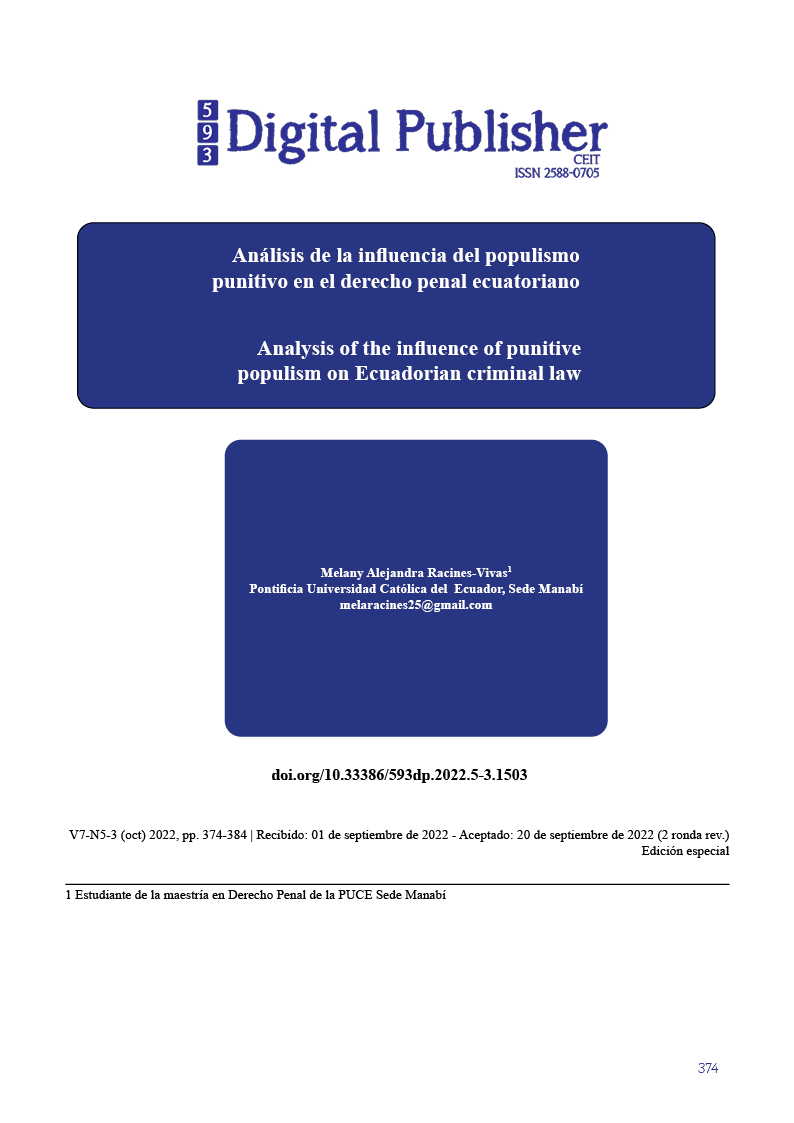Analysis of the influence of punitive populism on Ecuadorian criminal law
Main Article Content
Abstract
The present research paper analyzes the influence of punitive populism on Ecuadorian criminal law from 2008 to the present. The manifestations of punitive populism have been reflected in a series of events, such as the popular consultation of 2011, which included questions to achieve the typification of the crime of unjust private enrichmentas an autonomous crime and the criminalization of non-affiliation to social insurance as a criminal offence. In 2014, the penal system was completely modified through the issuance of the Organic Integral Penal Code, which led to an increase in penalties and the typification of a greater number of crimes compared to the previous Criminal Code. In 2018, a referendum and popular consultation was held where again there were questions that had to do with criminal issues such as the imprescriptibility of some crimes. Finally, some consequences of the influence of punitive populism are considered, mainly the increase in the prison population based on figures from 2008 and comparing them with the most current ones. In this research, a qualitative method is used, a theoretical-doctrinal and critical analysis is carried out regarding the legislative technique and the way in which some criminal offenses have been typified in Ecuador.
Downloads
Article Details

This work is licensed under a Creative Commons Attribution-NonCommercial-ShareAlike 4.0 International License.
1. Derechos de autor
Las obras que se publican en 593 Digital Publisher CEIT están sujetas a los siguientes términos:
1.1. 593 Digital Publisher CEIT, conserva los derechos patrimoniales (copyright) de las obras publicadas, favorece y permite la reutilización de las mismas bajo la licencia Licencia Creative Commons 4.0 de Reconocimiento-NoComercial-CompartirIgual 4.0, por lo cual se pueden copiar, usar, difundir, transmitir y exponer públicamente, siempre que:
1.1.a. Se cite la autoría y fuente original de su publicación (revista, editorial, URL).
1.1.b. No se usen para fines comerciales u onerosos.
1.1.c. Se mencione la existencia y especificaciones de esta licencia de uso.
References
Arias, F. (2012). El proyecto de investigación. Introducción a la metodología científica. Editorial Episteme.
Bernal, C. (2006). Metodología de la investigación. Pearson Educación.
Consejo Nacional Electoral. (2018). Referéndum y consulta popular 2018. https://www.cne.gob.ec/documents/Estadisticas/2018/libro%20resultados%20referndum%20y%20consulta%20popular%20de%202018_parte_1.pdf
Hernández, R., Fernández, C. y Baptista, P. (2003). Metodología de la investigación. Editorial Mc Graw-Hill.
Beck, U. (1998). La sociedad del riesgo. Hacia una nueva modernidad. Edt. Paidós.
Díez, J. (2007) La Política Criminal en la encrucijada. Edit. Euros Editores SRL.
Ferrajoli, L. (2011). Poderes Salvajes: La crisis de la democracia constitucional. Edit. Trotta S.A.
Garland.D.(2005). La cultura del control. Ed. Gedisa.
Jakobs, G. Y Cancio Meliá, M. (2003) Derecho penal del enemigo. Edit. Civitas Ediciones S.L.
Justicia (2017). El populismo punitivo es una tendencia errada en todo el mundo, Claus Roxin, autoridad mundial en derecho penal, habla de la justicia colombiana. El Tiempo.
Laurrauri, E. (2006). Populismo Punitivo, y como resistirlo. Jueces por la Democracia, 55, 15-23.
Marí, E. (1985). La problemática del castigo: el discurso de Jeremy Bentham y Michel Foucault. Editorial. Librería Achette.
Paladines, J. (2020). Derecho penal de Auschwitz- la continuación del estado dual. Edt. El Siglo.
Registro oficial suplemento N°490. (13 de julio de 2011). Resultados del referéndum y consulta popular 2011. https://www.funcionjudicial.gob.ec/www/pdf/baselegal/Consulta%20Popular%20y%20Referendum.PDF
Rodríguez, F. (2021). Curso de Derecho penal parte General. Tomo III. Teoría de la pena. Cevallos Editora jurídica.
Servicio Nacional de Atención Integral a Personas Adultas Privadas de la Libertad y a Adolescentes Infractores. (2022). Situación penitenciaria 2022. [Documento Excel]. https://www.atencionintegral.gob.ec/estadisticas/
Silva, J. (2006). La expansión del derecho penal, Aspectos de la política criminal en las sociedades postindustriales. d F Ed.
Sozzo, M. (2012). ¿Qué es el populismo penal? URVIO. Revista Latinoamericana de Seguridad ciudadana.11, 117-122.
Zaffaroni, E. (2006). El Enemigo en el Derecho Penal. Edit. Ediar.
Zaffaroni, E.(2012). Crímenes de masa. Ed. Madres plaza de Mayo.
Zaffaroni,E.(2012).La cuestión criminal.Ed.Planeta.
Zaffaroni, E y Días D. (2019). La nueva crítica criminológica – criminología en tiempos de totalitarismo financiero. Edt. El Siglo.
Normativa
Código Orgánico Integral Penal. Registro oficial 180 de 10 de febrero de 2014.
Constitución de la República del Ecuador. Registro Oficial 449 de 20 de octubre de 2008.

